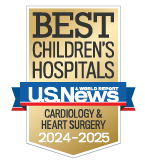Atrial Septal Defect (ASD)
What is atrial septal defect?
Atrial septal defect is a hole in the wall between the atria—the top two chambers of the heart. A small hole may not cause any problems, but if the hole is large or medium-sized, it changes the way blood flows through the heart. This change in blood flow can make the heart work harder than it should. This may lead to health problems.
Causes of ASD
Atrial septal defect is something children are born with. In most cases, the cause is unknown.
Signs and symptoms of ASD
Oftentimes, children with ASD do not have any symptoms.
If you child does have symptoms, they may include:
- Heart murmur
- Slow growth
- Rapid breathing
- Trouble eating
- Abnormal heart rate
- Trouble exercising
- Blue looking skin
Testing for ASD
These tests can help your care team diagnose ASD and create a treatment plan for your child:
Basic Testing:
-
Electrocardiogram (ECG)— a visual representation of the heart's electrical activity captured via monitors placed on the skin. This test is not painful.
-
Chest x-ray—a test that uses a small amount of radiation to create an image (or picture) within the chest to include the heart, lungs, blood vessels and bones. This test is not painful.
-
Echocardiogram (echo)—an ultrasound of the heart that evaluates the structure and the function of the heart by using sound waves. Still and moving pictures of the heart structures, heart valves, and heart function are recorded for review by a cardiologist. This test is not painful.
Treatment for atrial septal defect
There are several options for treatment:
Medical management:
Sometimes your doctor might recommend a “wait and watch” approach, since a small ASD may close on its own over time. Your child’s cardiologist would then see you regularly to monitor the size of the hole and whether it is causing any problems for your child.
Interventional cardiology:
Children with an ASD in the middle of the wall between the two chambers (known as secundum atrial septal defects) may be candidates for a repair of the hole with a small device. This procedure is called a transcatheter device closure, because the doctor accesses the heart through a catheter or small tube inserted in the blood vessels of the legs. Then, the tube is moved through the blood vessel into the heart. Once inside the heart, the doctor can place a device to close the ASD hole in the heart.
Surgical management:
ASDs that are larger or that are located in certain areas require open heart surgery to patch the hole or stitch it closed.
What to expect when your baby has atrial septal defect
A pediatric cardiology specialist will see your child and help manage the plan of care. Depending on your child’s condition, they may require surgery to close the ASD.
If the ASD is small, follow up appointments will be made and repeat testing such as echocardiograms will be done to see if the ASD closes on its own.
If it does not close, your doctor will discuss the interventional cardiology and surgical options with you for future/elective closure.
Healthy Heart
Sometimes, it’s easier to understand how your child’s heart is different if you have a clearer picture of how a healthy heart works. Experts at the Heart Center have provided the basics to help you learn about the heart’s structure and function.
Choosing your best home for your child’s care

The Heart Center at Children’s Mercy provides comprehensive care for your child as they grow.
When you’re choosing a care team for your child, it can be helpful to see how often our doctors perform certain procedures and how well children do after the surgery is over. Our surgical team performs hundreds of pediatric heart surgeries each year, often with outcomes that are better than the national average.
Care for your growing child
Following your child’s surgery, they will need close follow-up care with a cardiology provider. These visits will be spaced out as your baby grows. Even though most children lead healthy, active lives, your child may need cardiology care for their whole life.
Your child’s cardiology provider will continue to monitor via echocardiogram (heart ultrasound) and electrocardiogram (heart electrical activity) for heart valve problems or for problems with the heart’s electrical system (arrhythmia, abnormal heart beat). Since most babies born with atrial septal defects will live full lives into adulthood, as they reach an appropriate age, we will help your child transition to an adult cardiologist through our Transition Program.